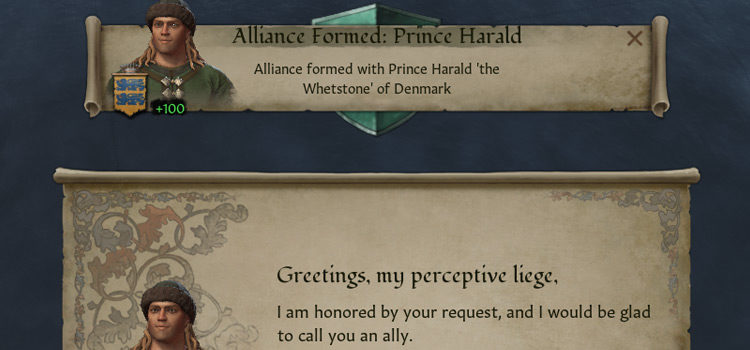EU4: How Do You Break An Enemy Alliance?
This post may contain affiliate links. If you buy something we may get a small commission at no extra cost to you. (Learn more).
A network of strong enemy alliances shouldn’t deter you from expanding. It only means you need to break them apart first.
There are several ways to do that. These can be categorized as Direct Methods and Indirect Methods, organized in the Table of Contents below:
A. Direct Methods
You can use diplomacy to ask a nation to end their alliance with another nation. A high diplomatic reputation can make it more likely that they’ll accept your request.
You can raise your diplomatic reputation by:
- Maintaining max legitimacy if you’re a monarchy
- Having zero overextension
- Taking the Diplomatic and/or Influence idea groups
- Getting the strategic bonus from trading in ivory
- Employing a statesman advisor
Depending on which nation you’re playing, you can also gain more bonuses from specific national ideas, religious boons, mission rewards, and great projects.
Note: Breaking alliances using these methods will set a ten-year truce between the former allies. However, you also have to consider that your target will seek out other alliances. Unless they’re geographically isolated, they’ll likely find a new ally within a few months.
A1. Call in Favors
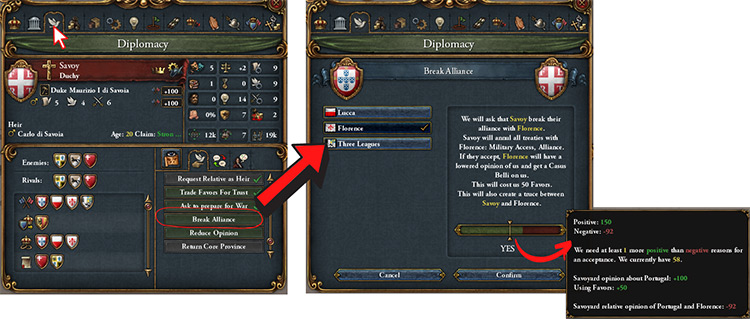
In the Diplomacy tab, under the Favors actions, you can ask one of your allies to break up with a third party at the cost of 50 favors.
You can only do this once every 10 years. You won’t be able to call in this type of favor from anyone else during that time.
You passively gain favors from an ally every month. The amount accrued is relative to the total strength of both your militaries.
You can also get more monthly favors by using the “Curry Favor” button under the Influence actions.
This is added on top of your passive gain and is based on:
- Your ally’s opinion of you
- Your diplomatic reputation
The total gains from these is modified by your own military power relative to your ally’s. This can be a negative modifier if your ally is more powerful than you.
Tip: You can track your monthly favors gain in the Diplomatic Feedback sub-tab.
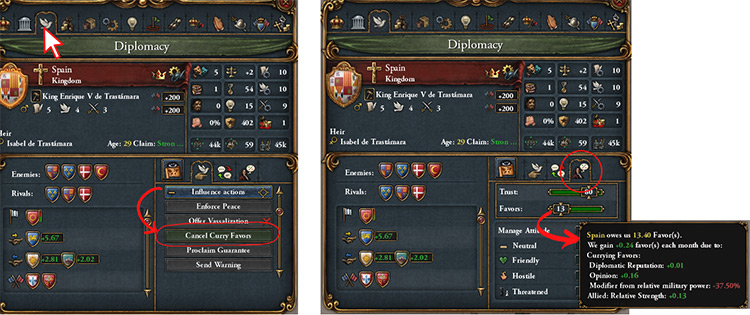
Alternatively, you can get favors if you give provinces to your ally in peace deals.
The amount gained scales with the war score cost for all provinces given, and your ally’s war contribution.
You’ll also get more favors from this if you haven’t promised land to your ally prior to inviting them into your war.
Note: Favors will decrease by -0.08 every month with a nation that you’re no longer allied with. All favors will immediately disappear if you declare war on them.
A2. Great Power Actions
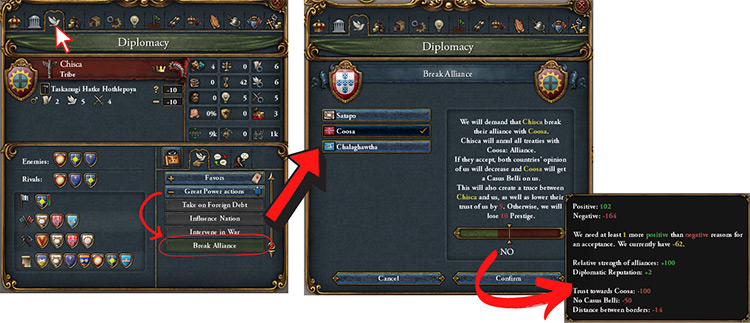
The top 8 nations ranked by total development and technology have access to the Great Power actions, which includes a “Break Alliance” option.
You can use this on anyone, regardless if they’re friendly with you or not. You can also do this as many times as you want, as long as your prestige isn’t negative.
Whether your ultimatum gets accepted is another matter.
Several factors can influence their decision, which may include but aren’t limited to:
- Your diplomatic reputation
- Your military strength
- The trust between the two allies you’re trying to break apart
- The trust between you and the nation you’ve requested this from
- The distance between your capitals (not borders, as the tooltip suggests)
- How recently you’ve used this option on another nation
If they do accept, then this’ll result in:
- A ten-year truce and -5 trust with the nation you’ve requested this from
- A five-year truce between the former allies
- A -50 opinion modifier from both parties
If they refuse, you’ll just lose 10 prestige.
Note: A country that falls from the 8th rank can still use the “Great Power” actions during a grace period of 5 years. They’ll lose them after that if they’ve not reclaimed their place in the rankings.
A3. Annul Treaties
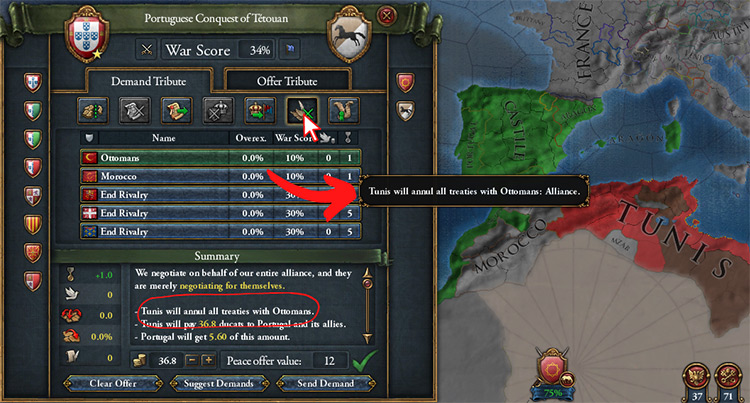
When suing for peace, you can demand an enemy to annul their treaties with a third party. This includes their alliance agreement.
This always costs 10% war score. The shared strength of their alliance doesn’t matter.
You can only demand this from the main recipient of your peace proposal.
If you want one of the minor combatants to break their own alliances, you’d have to sign a separate peace treaty with them.
B. Indirect Methods
Sometimes, subterfuge succeeds where friendship fails.
These methods aren’t tied to the game’s overt mechanics. Instead, these work around a specific limitation hard-coded into the game:
“A nation can’t be in multiple concurrent wars with another nation.”
Exploiting this rule doesn’t break alliances outright. Rather, it prevents nations from honoring their alliance with your enemy.
B1. Misdirection
An ally can be called to an offensive war if you have 10 favors with them.
If they’re also allied to a nation that you’re planning to attack, you can bring them along to an easy war first before declaring on your original target.
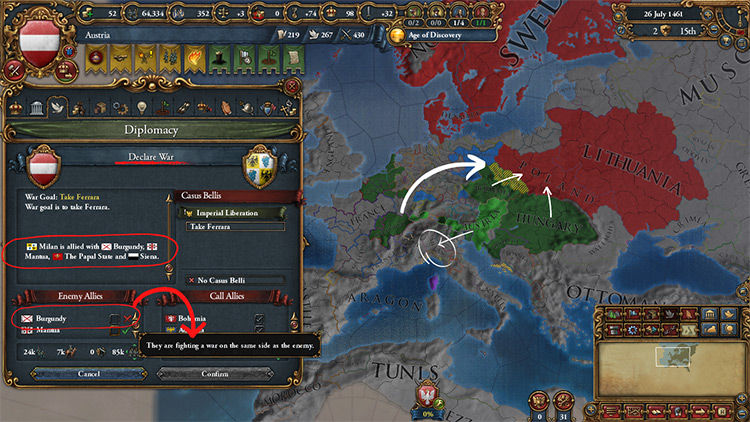
In this example, Austria wants to attack Milan, but both of them are allied to Burgundy, a regional powerhouse with high quality armies.
To deprive Milan of a capable defender, Austria declared a petty war on Poland and called on Burgundy to aid them.
With the Burgundians out of the picture, Austria’s war against Milan becomes so much easier.
B2. Passive-Aggression
If misdirection is a tactic to “push” allies away from your target, this one is where you “pull” your target from their allies.
You can drag your target into a war by declaring on one of their smaller allies.
Because your target is just a participant and not the war leader, they won’t be able to call their own allies into the fight. This is useful if they have a powerful ally, like with Milan and Burgundy in the previous example.
Your target should not be marked as a co-belligerent for this to work.
The disadvantage to this is that annexing or subjugating your target will be twice as expensive in terms of war score and diplomatic mana. You’ll also gain twice as much aggressive expansion.
However, all other peace deals will remain the same.
A good strategy is to drag your target into a quick war, and then demand that they annul their alliances. This makes them vulnerable in future wars, for when you actually want to take land from them.
